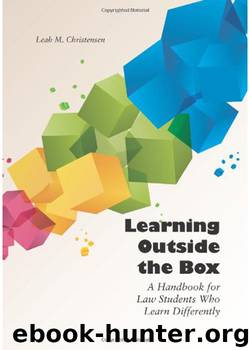Learning Outside the Box: A Handbook for Law Students Who Learn Differently by Leah M. Christensen

Author:Leah M. Christensen
Language: eng
Format: mobi
Publisher: Carolina Academic Press
Published: 2011-01-02T00:00:00+00:00
Chapter 9
Advice from Law Students Who Learn Differently
This section will offer the perspectives of three law students who learn differently. Each of the students was in their third year of law school at the time of the interview. The first two students had been diagnosed with a learning disability. The first student, Mary,1 knew she had a learning disability (ADD) prior to law school. She was diagnosed during her first year of college. Mary seemed to use this knowledge to her advantage by pursuing accommodations for her disability in law school right away. This seemed to work well for Mary in terms of her academic success. She studied very diligently and kept up with her work. She participated in several outside student groups and internships. At the beginning of her third year of law school, Mary was in the top 5% of her law school class.
The second law student, Laura, was diagnosed with a learning disability (ADHD) during her second year of law school. Laura suspected she had a disability earlier in her undergraduate studies but she was able to compensate for her learning differences in college. During her first year of law school, however, Laura found that she could not keep up the volume of reading. Further, Laura knew that she understood the material from her classes, but she struggled to put all that information together coherently on her exams. She felt unfocused and disorganized. Consequently, Laura did not test well in her first year exams despite her hard work; she felt her grades suffered as a result. Laura was tested for a learning disability at the beginning of her second year of law school and she was diagnosed with ADHD. At the time of this interview, Laura was in the top 50% of her law school class.
The third law student, Andrew, did not have a diagnosed learning disability although Andrew definitely felt that he learned differently. Andrew excelled in one-on-one situations. He worked for several law professors at school and also worked as a law clerk in a law firm. However, Andrew never felt completely at ease in law school. He enjoyed the practice of law far more than the classroom experience in law school. At the time of this interview, Andrew was in the top 30% of his law school class.
All three of these law students faced different challenges in law school and each of them learned very differently. Yet each of these students also achieved their own success in law school as well. While Mary experienced a great deal of academic success in law school, Laura and Andrew carved out their own success in other ways. Laura excelled in clinical programs and legal writing, and she worked successfully at several externships. Andrew worked for a law firm and held several research positions with law school professors. All three of these students became successful law students and I have no doubt they will become successful lawyers as well.
Here is their advice to you about navigating through the
Download
This site does not store any files on its server. We only index and link to content provided by other sites. Please contact the content providers to delete copyright contents if any and email us, we'll remove relevant links or contents immediately.
The Art of Coaching Workbook by Elena Aguilar(51165)
Trainspotting by Irvine Welsh(21643)
Twilight of the Idols With the Antichrist and Ecce Homo by Friedrich Nietzsche(18623)
Fangirl by Rainbow Rowell(9229)
Periodization Training for Sports by Tudor Bompa(8254)
Change Your Questions, Change Your Life by Marilee Adams(7760)
This Is How You Lose Her by Junot Diaz(6877)
Asking the Right Questions: A Guide to Critical Thinking by M. Neil Browne & Stuart M. Keeley(5759)
Grit by Angela Duckworth(5605)
Red Sparrow by Jason Matthews(5467)
Paper Towns by Green John(5179)
Room 212 by Kate Stewart(5105)
Ken Follett - World without end by Ken Follett(4723)
Housekeeping by Marilynne Robinson(4436)
The Sports Rules Book by Human Kinetics(4379)
Papillon (English) by Henri Charrière(4263)
Double Down (Diary of a Wimpy Kid Book 11) by Jeff Kinney(4261)
The Motorcycle Diaries by Ernesto Che Guevara(4089)
Exercise Technique Manual for Resistance Training by National Strength & Conditioning Association(4063)
